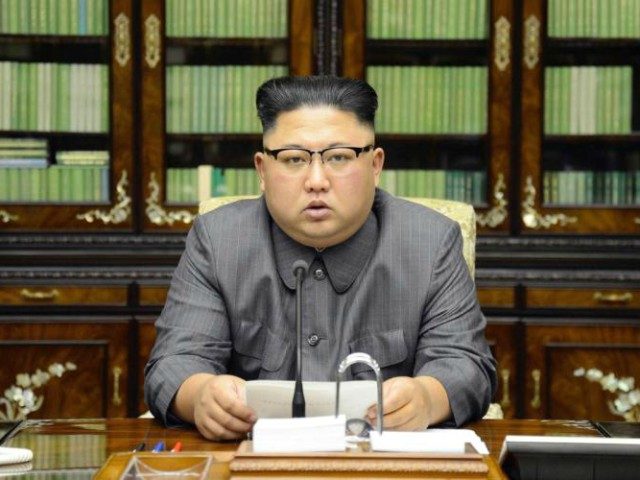On Thursday, North Korea’s Foreign Minister Ri Yong-ho said his nation may soon conduct a hydrogen bomb test over the Pacific Ocean.
“It could be the most powerful detonation of an H-bomb in the Pacific. We have no idea about what actions could be taken as it will be ordered by leader Kim Jong-un,” Ri told reporters in New York, where he was attending the United Nations General Assembly.
Fox News, among many other media outlets, view Ri’s remark as part of dictator Kim “Rocket Man” Jong-un’s furious backlash against President Donald Trump’s address to the U.N. Kim has publicly vowed to retaliate against Trump for his comments, and to intensify his regime’s efforts to obtain reliable nuclear-tipped intercontinental ballistic missiles.
CNN helpfully volunteered some predictions about what would happen if North Korea really does conduct the first atmospheric test since the Eighties, most likely delivered with an ICBM to prove that Pyongyang has both hydrogen bombs and missile delivery systems.
“Regardless of the geopolitical fallout, the environmental effects could be devastating,” CNN warns. “Those living near Bikini Atoll, where the US tested many of its nuclear weapons in the mid to late 20th century, are still dealing with a range of health-related issues. The blast would likely destroy or contaminate fish and marine life, leaving a series of incalculable knock-on effects.”
Of course, much would depend on precisely which location in the vast Pacific Ocean North Korea chooses for its test detonation, the accuracy of the missile system, whether or not North Korean scientists accurately account for the influence of weather and tides, and whether Kim Jong-un cares about the environmental effects. He is notoriously disinterested in the welfare of his own people, never mind South Koreans or Japanese who might end up swimming in radioactive seawater.
The New York Times reports that “analysts doubt whether North Korea has the technology or political daring to conduct an atmospheric nuclear test.” But on the subject of political will, analysts quoted by the Times argue that Kim’s entire “leadership identity” is based on his absolute refusal to back down, so he is likely to take some action that will escalate his confrontation with President Trump.
Other observers quoted by the NYT pointed out that North Korea would have great difficulty moving ships or planes with the instruments needed to analyze the blast into remote corners of the Pacific, so they would be unlikely to gain much useful feedback from the threatened atmospheric test, making further underground nuclear tests and non-nuclear ICBM test launches more practical.
A U.S. official told Reuters on Friday morning that it would be a “game-changer” if North Korea carried out the threatened atmospheric H-bomb test, but the Trump administration does not give “too much credence” to the threat.
The official said a “certain amount of bluster” is taken for granted with North Korea, but added that “we have to some extent take it seriously.”
Monitoring group 38North posted a review of the Kim regime’s latest underground nuclear test which concluded that “some of North Korea’s key claims, such as having conducted a large underground nuclear test (with a device capable of yielding “hundreds of kilotons”) have apparently now been corroborated.”
The most important of those claims is that the test weapon was a hydrogen bomb, which would mean North Korea has come very close to miniaturizing nuclear weapons enough to fit them inside missile warheads. Although there are still some questions to be answered about the seismic data and radiation readings from the test site, analysts are leaning toward the conclusion that the device tested was indeed an H-bomb.
Another 38North analysis published on Friday concludes that the latest round of sanctions ordered by President Trump amount to “unilateral instruments of a U.S. economic war against North Korea in which states and firms will all have to comply or be US targets.” The report sees this as a high-stakes gamble that might work, or might push Kim Jong-un into escalating the situation until military conflict becomes inevitable.
Among the key questions are whether the U.S. has the political will to enforce a virtual trade embargo against North Korea at a high humanitarian cost to North Korean civilians—Kim is certainly not above using his own people as hostages—and whether even the toughest sanctions can break the regime’s will before it completes its scramble for nuclear missiles that can reliably strike the continental United States.
From this perspective, Kim might either have an incentive to conduct a highly provocative atmospheric nuclear detonation over the Pacific—or he might feel refraining from such final provocations is the safer bet, because he can use the suffering of the North Korean people to influence world opinion, and is likely to win the race for nuclear ICBMs before sanctions seriously threaten his grip on power.

COMMENTS
Please let us know if you're having issues with commenting.